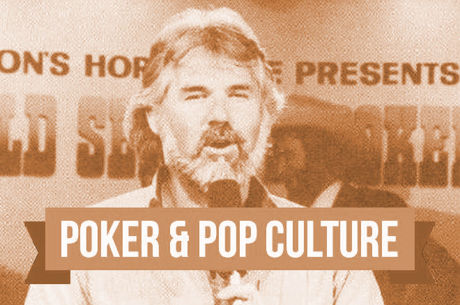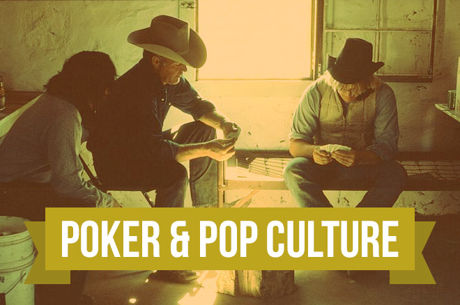Poker & Pop Culture: Always Be Wary When W.C. Fields is Dealing
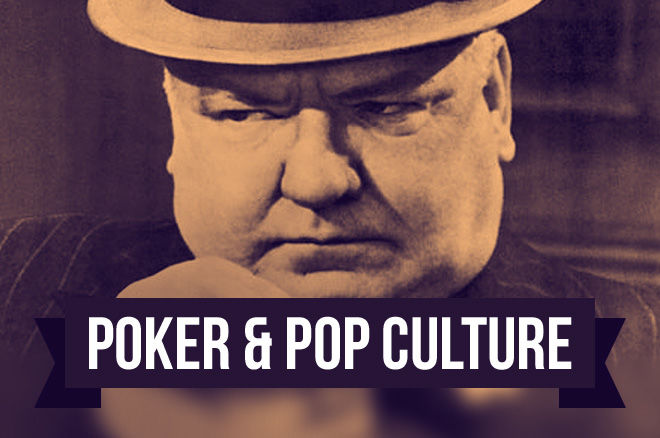
When it comes to iconic images of poker in popular culture, right alongside Cassius M. Coolidge's "Dogs Playing Poker" and Wild Bill Hickok's "dead man's hand" is the one of the great comic performer and early film star W.C. Fields steathily peering out from under a stovepipe hat over a carefully-protected poker hand.
There's a certain irony in the image, however. While Fields is the one looking wary, his opponents are really the ones who ought to be suspicious. After all, whenever any of Fields' characters played poker, it was pretty much a given the game would be crooked.
That image — from the 1940 fiilm My Little Chickadee — comes from one of several scenes featuring Fields playing poker in the movies, all of which help highlight both the prominence of the game during the early 20th century and its functionality as both a dramatic and comic plot device.
Going for grins, not gambling
Born in 1880 in Pennsylvania, William Claude Dukenfield made his first entry into show business at the turn of the century as a juggler. He earned fame immediately for his ability to incorporate laughs into what were largely non-speaking performances simply by his expression or other physical gestures.
Such would be the source of a lot of later humor in Fields' poker-playing scenes, where his priceless reactions of dismay or delight to the cards and situations were what made the scenes.
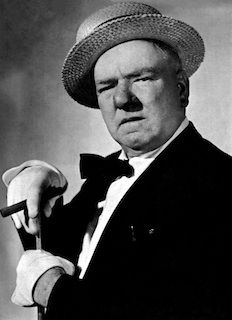
After much success in vaudeville and on the Broadway stage, Fields became a film star during motion picture's early silent era, appearing in numerous shorts and features. By the 1930s Fields moved over into talkies where his star shone even more brightly in dozens of films until his death in 1946.
Whether in supporting or starring roles, Fields more often than not portrayed variations of a similar character — the con man, constantly pulling things over on witless others as the audience knowingly laughed along. Whether a pool shark, a circus carny, a traveling confidence man, or even in "straight"-seeming roles, Fields was frequently the trickster, with poker occasionally being the means by which his characters took advantage of others.
Interestingly, while there are stories of Fields having perhaps been something of a pool hustler in his youth, in real life Fields was highly averse to gambling. Having endured poverty as a child, Fields was notoriously cautious with his money. Being afraid of uncertain investments, Fields largely escaped the effects of the 1929 stock market crash (although he'd sometimes claim otherwise afterwards, say, during contract negotiations).
In fact, during his days on the vaudeville circuit, Fields was said to have opened bank accounts in every city he visited. The comedian once claimed to have opened over 700 accounts, although that figure — like many other examples of Fields' embellishing his life story — was likely exaggerated.
"The truth is that he practically never gambled on anything," writes Fields biographer Robert Lewis Taylor. "He felt that there was an ugly element of chance in gambling which made it possible for somebody other than himself to win."
When one looks at some of the poker scenes from Fields' movies, one realizes that the element of chance has been summarily eliminated in every case.
Four make four of a kind in Tillie and Gus
Probably my favorite W.C. Fields poker scene — one I typically share with my "Poker in American Film and Culture" class — comes from the first feature-length talkie in which Fields had a starring role, Tillie and Gus (1933).
Fields plays Augustus Q. Winterbottom, a con artist whom we first meet in the film on trial for having shot a man during a game of draw poker.
"Have you anything to say before I find you guilty?" the judge menacingly asks him on the stand.
"So you're going to deal from a cold deck, eh?" Winterbottom replies.
He then attempts to defend his actions by explaining that during the game he had dealt himself four aces, only to find his opponent (and soon-to-be shooting victim) had drawn five aces.
"I'm a broad-minded man, gents," he says. "I don't object to nine aces in one deck. But when a man lays down five aces in one hand... and besides, I know what I dealt him!"
Rather than toss him under the jail as he deserves, the judge absurdly rules Winterbottom must leave town, something he is more than glad to do once he receives a letter suggesting his ex-wife's brother has recently passed away, leaving him part of his estate. As it happens, Gus finds himself reunited on the train with his estranged wife, Tillie, played by Alison Skipworth, who has received a similar letter.
While Tillie and Gus scheme how to get themselves appointed her niece's guardians and thus claim the greater share of her dead brother's estate, a man stops to ask Gus if he would be interested in a game of poker.
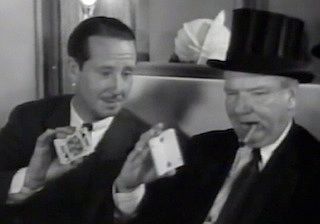
"Poker?" Gus answers uncomprehendingly. "Is that the game where one receives five cards, and if there's two alike that's pretty good, but if there's three alike that's much better?"
It's a ruse much like the one John Backus pulls in Mark Twain's story "The Professor's Yarn" — the hustler pretending to be new to poker in order to lessen others' suspicions that he's about to hoodwink them.
"Yes," the man replies. "Oh, you'll learn the game in no time," he adds, eagerly directing Gus to the rear car.
Gus joins three others around a crowded table, and they explain to him the process by which they will cut the cards to see who will deal. The others draw a queen, ten, and king, then Gus picks up the 2♥. "Ace," he says, holding the card so it cannot be seen by the others, then quickly reconstituting the deck. When they object, he sorts through the deck, pulls out an ace, and shows it proudly as his card.
The game is five-card draw. Gus deals, and Tillie appears to the side looking over one player's shoulder to see his hand — 4♠2♦3♣J♠J♦.
"By the way, I saw those two sailors off the ship today," she says disinterestedly to Gus. She then leans over to inspect another player's hand — 4♣8♦9♠3♥5♣. "See anybody else?" asks Gus. "Not a soul," she replies.
The players draw, and we watch as Gus examines his hand, one card at a time. First he sees the A♦. Next, the A♣. Then, the A♥.
"Godfrey Daniel!" he mutters, a favorite expression often used by Fields as an approximation of an expletive otherwise disallowed by censors. He turns up the fourth card — the A♠! "Goodness gracious," he exclaims. The fifth card is the 2♠. "Shucks," he says.
"What happened to the two sailors?" he asks Tillie. "Three more sailors joined them," she replies. "Three more?" says a confused Gus. "I mean two," she corrects herself.
The betting commences, and all four players stick around for the showdown. The first shows four jacks, the second four queens, and the third four kings. "It'll take four aces to beat me," says the latter.
"What a coincidence," says Gus, fanning out his hand.
Aces all around on the Mississippi
Besides being just plain funny, the scene in Tillie and Gus is a great one for illustrating both poker's earlier reputation as a "cheating game" and the game's social aspect, often serving as a ready way for strangers to meet and interact such as when traveling. In my class I pair the scene with the classic one from The Sting, a 1973 film set during 1930s, which likewise shows cheating in a poker game played aboard a train.
A couple of years later Fields had a memorable supporting role in a musical comedy called Mississippi (1935) that starred Bing Crosby. Set on a riverboat, Fields plays the boat's pilot, Commodore Orlando Jackson, and is featured in a scene involving another less than honest poker game.
Rather than describe this one for you, you can watch it for yourself. It again involves some shady dealing from Fields, who once more finds himself drawing four aces, although somehow he keeps getting a fifth ace each time he tries to draw another card.
Not only that, everyone else seems to be getting aces, too! Take a look:
More dirty dealing in My Little Chickadee
After a lengthy tenure with Paramount, toward the end of his career Fields moved over to Universal where he starred in such films as You Can't Cheat an Honest Man (1939) and Never Give a Sucker an Even Break (1941) which like other Fields films have titles that themselves suggest poker maxims.
Hollywood icon Mae West, another vaudeville veteran, had also recently made the move from Paramount to Universal, and the studio decided it would be a good idea to pair Fields and West in the 1940 feature My Little Chickadee.
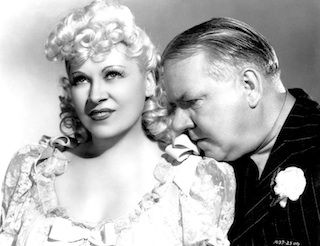
Like other Fields movies (especially the later ones), My Little Chickadee features a somewhat nonsensical plot that mostly exists to provide opportunities for comedic ad-libbing. Taking off from West's already well-established persona as a trouble-causing seductress given to sexually-suggestive double-entendres, here she plays a character named Flower Belle Lee who right away is shown being run out of the small town of Little Bend after having been suspected of having an illicit affair with a certain Masked Bandit.
On the train out of town, Flower Belle encounters a card cheat who tells her of his exploits. Eventually Fields arrives as Cuthbert J. Twillie and he offers to show Flower Belle some card tricks, though gets interrupted. The real card-playing comes soon enough, though, once the train arrives at a town called Greasewood.
We follow Twillie into a saloon where a poker game is a permanent fixture. After an interlude a seat opens up and Twillie joins the table. "Give me a hundred dollars worth of chips!" he announces triumphantly, though is deflated somewhat when he finds his buy-in only gets him a single white chip.
"That's my stack, eh?" he says, holding it up. "Well, from a little acorn grew the mighty oak."
Cross-fade to a large stack of chips before him. "Beginner's luck, gentlemen!" he explains, deftly shuffling for the next deal. The audience knows where his opponents went wrong, having let Twillie handle the cards.
That's the scene where appears the famous sight of Fields peering over his cards. A little later in the movie comes one of the more memorable movie lines about poker.
After meeting Flower Belle's country cousin, Twillie encourages him to get out his money and join him for a game of cards. The victim spreads his cash on the table, asking excitedly as he does "Is this a game of chance?"
"Not the way I play it, no," comes the reply.
Of course, when W.C. Fields is the one dealing, poker never is.
From the forthcoming "Poker & Pop Culture: Telling the Story of America's Favorite Card Game." Martin Harris teaches a course in "Poker in American Film and Culture" in the American Studies program at UNC-Charlotte.


